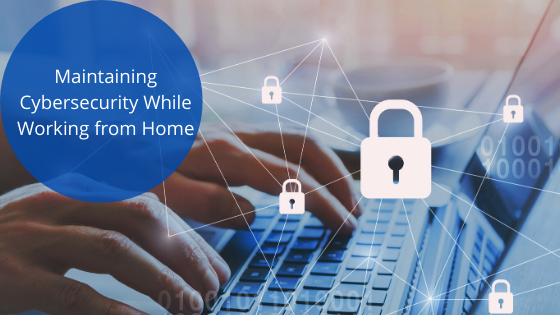Maintaining Cybersecurity While Working from Home
Submitted by Neville Associates on April 16th, 2020
With businesses around the country reducing their in-office staff to essential personnel only—in some cases, literally overnight—many remote workers found themselves setting up a full home office on short to no notice. But while advances in videoconferencing and data technology have made working remotely easier than ever, these technological advances can also come with some major security risks that hackers are eager to exploit. Read on for some tips and tricks to help you maintain security while working remotely.
What Actions Can Put Remote Workers at Risk?
One of the biggest cybersecurity risks, from an employer's perspective, is "data leakage." This occurs when data is moved from a secured network that offers end-to-end encryption (like many companies' VPNs) to an unsecured network, like public WiFi or a home WiFi connection, where this information can easily be stolen. If you've ever forwarded a confidential work document to your private email so that you can edit it or print it at home, you've essentially made this document publicly-viewable by anyone who can quietly gain access to your account.
Data leakage can put employees' personal data at risk, too. A hacker that gains access to your private computer in pursuit of sensitive or confidential work information need not stop there; they can also steal credit card numbers or install ransomware that will force you to pay a ransom to regain access to your personal files. And with so many employees now working in a different building than their trusted supervisors and coworkers, phishing scams—involving a harmful email that appears to come from a trusted source—have increased significantly.
What Can Remote Workers Do to Protect Data?
Remote workers should be on the lookout for any emails claiming that their login credentials or passwords are expired. This common phishing scam encourages recipients to click on an internal link, directing them to the scammer's page to input sensitive data. Fortunately, it can be easy to verify that this type of request is authentic by sending a separate email instead of clicking on an internal link.
Other steps employees can take to protect their data include:
- Minimizing the amount of work performed on personal devices, if possible;
- Using a VPN or another secure connection instead of an unsecured home internet connection;
- Update your anti-virus software;
- Ensure that your security software is up-to-date, including add-ons and privacy tools;
- Lock your computer screen while you're away; and
- If you travel with a work laptop, carry it with you whenever possible or secure it carefully in the trunk of your vehicle to discourage theft.
Taking these steps can transform your home into a secure remote workspace, reducing your odds of technology issues, ransomware attacks, or phishing scams that can compromise your productivity and put your job at risk.
LPL Tracking # 1-982725
Sources
https://www.enisa.europa.eu/tips-for-cybersecurity-when-working-from-home

